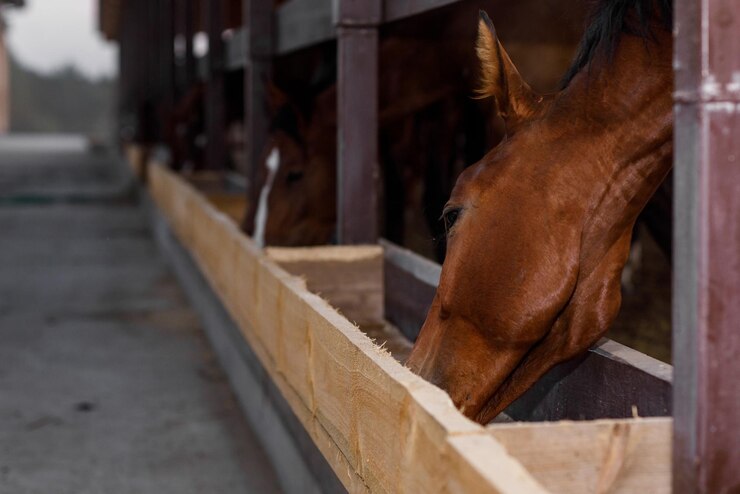As equestrian enthusiasts, we understand the importance of providing the best possible care for our horses. In particular, feeding broodmares is crucial to ensure both the health of the mare and the development of a strong, healthy foal. Establishing a well-balanced feeding broodmares schedule is a key element of horse care. This article will help you navigate the best practices for feeding broodmares.

Importance of Proper Nutrition for Broodmares
Feeding broodmares appropriately is essential for several reasons. During pregnancy and lactation, mares have increased nutritional requirements to support their own health and the growth and development of their foal. Proper nutrition helps ensure a successful pregnancy outcome and contributes to the mare’s ability to produce adequate milk for her foal.
Understanding Nutritional Needs
While each mare’s needs can be unique, there are basic nutritional elements that all broodmares require. These include adequate protein, energy, vitamins, and minerals. It is essential to understand these elements when establishing a feeding schedule for your broodmare.
Protein and Energy
Broodmares require a higher protein intake during certain stages of their reproductive cycle. Protein supports tissue growth in the developing foal and helps the mare maintain her body condition. Energy needs also increase, particularly in the final trimester.
Vitamins and Minerals
Vitamins such as A, D, and E are vital for broodmares, along with minerals like calcium, phosphorus, and selenium. These nutrients support the overall reproductive health of the mare and aid fetal development. It’s essential to test your hay for quality and deficiencies, an approach elaborated in this article.
Establishing a Feeding Schedule
Every feeding schedule should cater to the individual needs of the mare, considering factors like age, weight, and the stage of pregnancy. A consistent schedule supports better digestive health and nutrient absorption.
Early Gestation
In the initial stages of pregnancy, nutrient demands are closer to those of a non-pregnant adult mare. It is recommended to use high-quality forage as a base, supplemented with a balanced grain concentrate if needed.
Late Gestation
As pregnancy progresses, nutrient requirements significantly increase. This is when energy and protein demands are at their peak. Careful attention should be paid to balancing energy intake with forage alternatives, such as second cut hay.
Lactation Period
During lactation, a mare’s nutritional needs reach their highest. A well-structured diet ensures she can produce sufficient milk while maintaining her health. For guidance on performance feeding, visit this schedule.
Dietary Adjustments Based on Individual Needs
Monitor your mare’s weight and body condition regularly. Adjust their diet as needed in consultation with a veterinarian or an equine nutritionist. Individual adjustments are often necessary for tailored care.
Common Nutritional Deficiencies
Maintaining a balanced intake of all nutrients is key. However, some nutrients are more frequently deficient in equines. To gain insight into common deficiencies, this expert review is invaluable.

FAQs
What are the primary dietary needs of broodmares?
Broodmares require adequate protein, energy, vitamins, and minerals, particularly during late gestation and lactation.
How can I identify nutritional deficiencies in broodmares?
Nutritional deficiencies can be identified through regular monitoring and testing of feeds. Consultation with professionals can provide tailored solutions.
How often should feeding schedules be adjusted?
Feeding schedules should be reviewed regularly, at least with any change in the mares reproductive cycle or noticeable change in condition.
This article contains affiliate links. We may earn a commission at no extra cost to you.
